10 books for a bright future
It’s easy to get bogged down in the present when times are hard. These titles will help you look forward with confidence

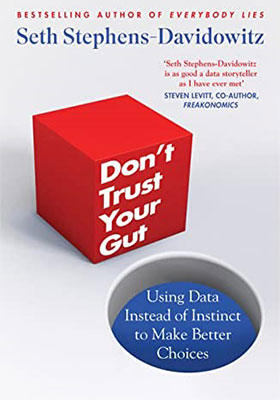 Don’t Trust Your Gut: Using Data Instead of Instinct to Make Better Choices | Seth Stephens-Davidowitz
Don’t Trust Your Gut: Using Data Instead of Instinct to Make Better Choices | Seth Stephens-Davidowitz
Recommended by: Niro Sivanathan, Professor of Organisational Behaviour and Chair of the PhD programme
The author uses big data to evaluate how accurate or otherwise conventional wisdom is in human activities such as dating, parenting and shopping, and concludes that the activities that bring us the least pleasure involve sitting on the couch. He also points out that media narratives tend to distort our perspectives – for example, by celebrating young entrepreneurs when data clearly shows that older entrepreneurs are more successful. It’s a wonderful reminder of the importance of nuance in the data we use to guide our judgements, decisions and behaviour, and a fun and useful read.
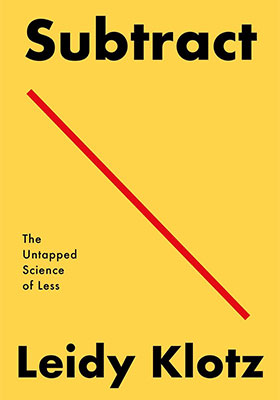 Subtract: The Untapped Science of Less | Leidy Klotz
Subtract: The Untapped Science of Less | Leidy Klotz
Recommended by: Kathleen O’Connor, Clinical Professor of Organisational Behaviour and Director of Executive Education
I’ve been spreading the good news about the ideas in this book for months now. In Executive Education programmes we try to encourage people to use new tools and tactics. Truth is, often the best course of action is not to add — more plans, more actions, more tactics — but to remove something. Think of it as Marie Kondo-ising your team, your department, your company. If it isn’t useful or it doesn’t spark joy, as Marie Kondo would urge, get rid of it. I now prompt executives to ask their people, “If I could remove one obstacle to make you more effective and happier, what would it be?” There is gold in the answer to that question.
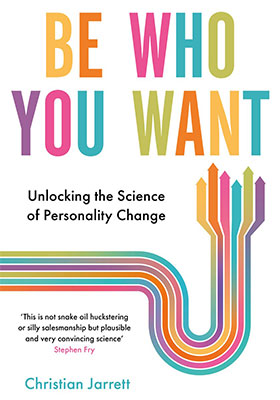 Be Who You Want: Unlocking the Science of Personality Change | Christian Jarrett
Be Who You Want: Unlocking the Science of Personality Change | Christian Jarrett
Recommended by: Randall S Peterson, Professor of Organisational Behaviour and Academic Director, Leadership Institute
People change, and the great news is you get to have a say in how – and that in turn will influence how your life pans out from here. Drawing on the latest science, Jarrett provides evidence-based tools for self-reinvention for each of the “big five” personality traits – extroversion, neuroticism, openness, agreeability and conscientiousness. You don’t have to stick with how you’ve always pictured yourself or how other people, or even a personality test, once defined you. With actionable principles, including being honest with yourself and asking for help from others, this book is about shaping yourself into the person and leader you want to be.
Discover fresh perspectives and research insights from LBS
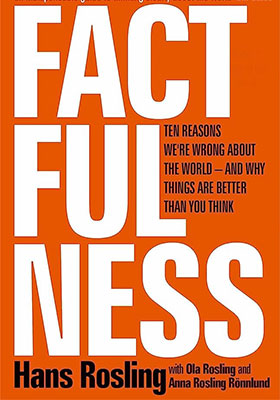 Factfulness: Ten Reasons We’re Wrong About the World – and Why Things Are Better Than You Think | Hans Rosling
Factfulness: Ten Reasons We’re Wrong About the World – and Why Things Are Better Than You Think | Hans Rosling
Recommended by: Tiago Ivo Martinho, Executive Director, Wheeler Institute for Business and Development
The starting point for this wise and optimistic book by the legendary late Swedish statistician is why so many smart people get the numbers so wrong on some of the most urgent global concerns, such as poverty, pandemics and climate change. It’s only by truly understanding the present realities that we can create a better future, he argues. A lot has happened since the book was first published in 2018, but its sense of optimism is more important than ever today.
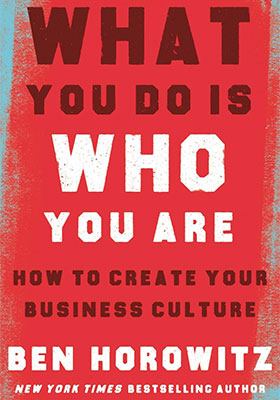 What You Do Is Who You Are: How to Create Your Business Culture | Ben Horowitz
What You Do Is Who You Are: How to Create Your Business Culture | Ben Horowitz
Recommended by: Florin Vasvari, Professor of Accounting and Academic Director, Institute of Entrepreneurship and Private Capital
Ben Horowitz, a leading venture capitalist, modern management expert, and New York Times best-selling author, combines lessons from history and modern organisational practice with practical and often surprising advice to help us build cultures that can weather both good and bad times.
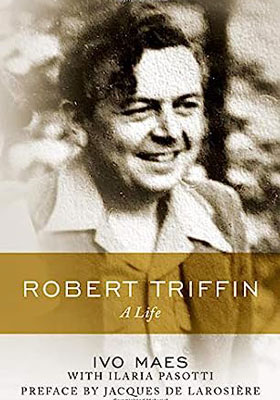 Robert Triffin: A Life | Ivo Maes
Robert Triffin: A Life | Ivo Maes
Recommended by: Linda Yueh, Adjunct Professor of Economics
This is a biography of the Belgian economist whose proposal for a European single currency came to pass. A contemporary of JFK and Jean Monnet, Triffin had a front-row seat at events in America and Europe that changed our world. He was even called our first “Atlantic citizen” by the US President, who said we need more of them! I find that biographies that detail successes but also failures are inspiring.
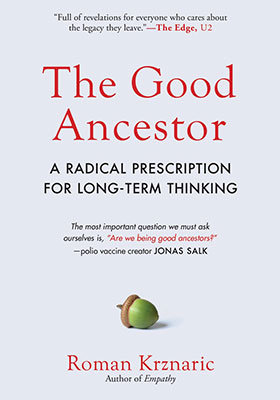 The Good Ancestor: How to Think Long Term in a Short-Term World | Roman Krznaric
The Good Ancestor: How to Think Long Term in a Short-Term World | Roman Krznaric
Recommended by: Ioannis Ioannou, Associate Professor of Strategy and Entrepreneurship
This makes the case for longer-term thinking in politics, capitalism and Western society, with sound ideas on how to redesign democracy, economies, business and environmental policy. One of Krznaric’s most powerful ideas is that we are “colonising” the future when we dump nuclear waste, cause ecological degradation and act in ways that will reduce the wealth of the people of tomorrow. He calls for radical solutions, such as transforming the growth goals of economies to reflect the rights of future generations.
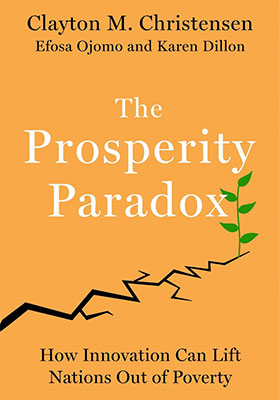 The Prosperity Paradox: How Innovation Can Lift Nations Out of Poverty | Clayton M Christensen
The Prosperity Paradox: How Innovation Can Lift Nations Out of Poverty | Clayton M Christensen
Recommended by: Zipporah Gatiti EMBA2015, Founder and CEO, Taste of Kenya
This book talks about the limits of economic development models such as aid which, despite trillion-dollar spends, has failed to lift nations out of poverty. The author suggests a new framework for tackling poverty by focusing on unserved markets and creating long-term economic and social prosperity. It’s a book full of hope for what entrepreneurs can do to create prosperity for all and a wonderful model with the potential to change the lives of billions of people at the base of the pyramid.
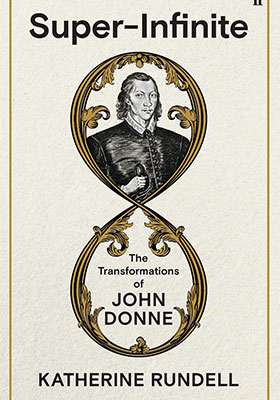 Super-Infinite: The Transformations of John Donne | Katherine Rundell
Super-Infinite: The Transformations of John Donne | Katherine Rundell
Recommended by: Andy Craggs, Programme Director and author of The Change Mindset
This biography on John Donne is written in an energetic and contemporary style about what he achieved as a poet, politician and preacher in 16th-century England. The author is best known for children’s books, so this makes an interesting departure for her as a writer reinventing herself in new ways. Rundell vividly illuminates how Donne applied curiosity, courage and conviction throughout his life to thrive – attributes that remain highly relevant for leaders today.
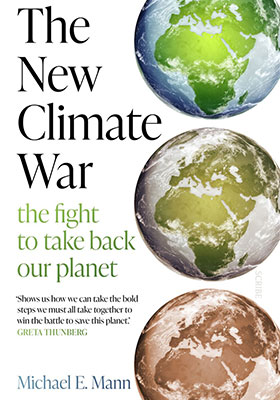 The New Climate War: The Fight to Take Back our Planet | Michael Mann
The New Climate War: The Fight to Take Back our Planet | Michael Mann
Recommended by: Christopher Moseley, Senior PR Manager
Climate denial is almost dead. Even in the US, a majority of Americans now accept the science behind climate change. But the naysayers and those with vested interests will not give up without a fight. So-called “inactivists” have changed their tactics in order to confuse and obfuscate the ongoing public debate on climate change.
Michael Mann, academic and author of The New Climate War, tells this story. Mann is at the forefront of climate research. His famous “hockey stick” curve demonstrated the extraordinary rate of recent temperature rises and he was a target during the scandal of “Climategate”, when computer hackers stole a series of emails in a dishonest attempt to undermine confidence in climate science.





 Don’t Trust Your Gut: Using Data Instead of Instinct to Make Better Choices
Don’t Trust Your Gut: Using Data Instead of Instinct to Make Better Choices Subtract: The Untapped Science of Less
Subtract: The Untapped Science of Less Be Who You Want: Unlocking the Science of Personality Change
Be Who You Want: Unlocking the Science of Personality Change Factfulness: Ten Reasons We’re Wrong About the World – and Why Things Are Better Than You Think
Factfulness: Ten Reasons We’re Wrong About the World – and Why Things Are Better Than You Think What You Do Is Who You Are: How to Create Your Business Culture
What You Do Is Who You Are: How to Create Your Business Culture Robert Triffin: A Life
Robert Triffin: A Life The Good Ancestor: How to Think Long Term in a Short-Term World
The Good Ancestor: How to Think Long Term in a Short-Term World The Prosperity Paradox: How Innovation Can Lift Nations Out of Poverty
The Prosperity Paradox: How Innovation Can Lift Nations Out of Poverty Super-Infinite: The Transformations of John Donne
Super-Infinite: The Transformations of John Donne The New Climate War: The Fight to Take Back our Planet
The New Climate War: The Fight to Take Back our Planet